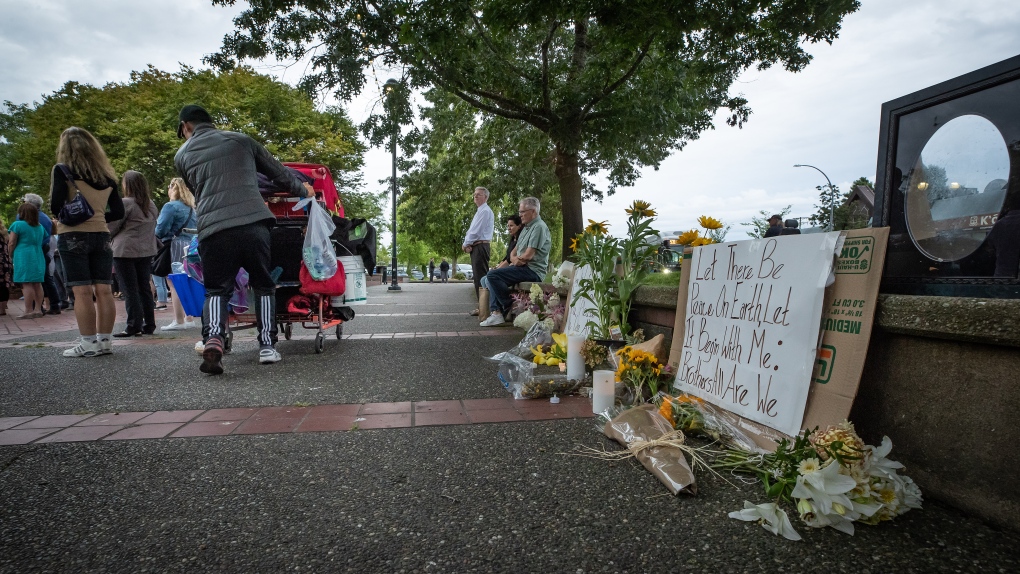B.C. commissioner wants Human Rights Code protections for homeless people after attacks
 A person pushes a cart of belongings past a memorial for Steven Furness and Paul Wynn, the two men who were killed by a gunman during a series of attacks on homeless people last month, in Langley, B.C., on Wednesday, August 3, 2022. THE CANADIAN PRESS/Darryl Dyck
A person pushes a cart of belongings past a memorial for Steven Furness and Paul Wynn, the two men who were killed by a gunman during a series of attacks on homeless people last month, in Langley, B.C., on Wednesday, August 3, 2022. THE CANADIAN PRESS/Darryl Dyck
After a violent week that saw multiple attacks on homeless people in B.C., the province's human rights commissioner is renewing her call to add protections for "social condition" under the provincial Human Rights Code.
In a statement Wednesday, commissioner Kasari Govender shared her reaction to the recent shootings of multiple unhoused people in Langley, as well as a Vancouver woman who was set on fire by a stranger.
"Last week's violence is a stark reminder of the devastating impacts of hate and violence on those most marginalized by poverty and housing insecurity," Govender said. "People who are unhoused deserve protection from discrimination and violence."
In May 2020, Govender's office issued a report recommending the addition of "social condition" as a protected class in the B.C. Human Rights Code.
The phrase is intended to encompass homeless and poverty, with the report recommending the following definition:
"Social condition means social or economic disadvantage on the basis of level or source of income, occupation or lack of employment, housing status including homelessness, level of education or literacy or any other similar circumstance."
Several other jurisdictions – including Quebec, New Brunswick, Manitoba, and the Northwest Territories – have incorporated elements of this definition into their human rights legislation.
The report noted that it is far from the first to recommend such a change in B.C. Human rights agencies in the province have been calling for such a change since at least 1998, according to the report.
CTVNews.ca Top Stories

BREAKING Toronto MP and former Liberal cabinet minister Marco Mendicino won't seek re-election
Marco Mendicino, a prominent Toronto member of Parliament and former minister of public safety and immigration, won't run in the next federal election, CTV News has learned.
U.S. soldier shot self in head before Cybertruck exploded outside Trump's Las Vegas hotel, officials say
The highly decorated U.S. Army soldier inside the Tesla Cybertruck that burst into flames outside U.S. President-elect Donald Trump's Las Vegas hotel shot himself in the head before the explosion, officials said Thursday.
Toys "R" Us Canada closing 5 stores, expand HMV and add play spaces to some shops
Toys "R" Us Canada says it is closing five Ontario stores and revamping several others as it works to "optimize" its business.
Possible scenarios that could play out in Ottawa as the Liberal government teeters
Prime Minister Justin Trudeau is said to be reflecting on his future over the holidays after the resignation of his top cabinet minister, Chrystia Freeland, in mid-December. The bombshell move prompted a fresh wave of calls for Trudeau to step down as Liberal leader from inside and outside the caucus.
FORECAST Weather warnings issued in 7 provinces and territories
Wintry weather conditions, including heavy snow and wind chill values around -55, prompted warnings in seven provinces and territories Thursday.
When you should see a doctor and other health advice, according to a nurse
As many begin the new year with health resolutions, here's one nurse's advice on when to see the doctor, get tests and seek preventative care.
Apple to pay US$95M to settle lawsuit accusing Siri of snoopy eavesdropping
Apple has agreed to pay US$95 million to settle a lawsuit accusing the privacy-minded company of deploying its virtual assistant Siri to eavesdrop on people using its iPhone and other trendy devices.
Calgary army reservist and museum curator killed while ice climbing in B.C.
A Calgary army reserve officer was killed in an ice-climbing accident in eastern British Columbia over the holidays.
Woman, father killed on New Year's Eve were victims of intimate partner violence: Halifax police
Halifax police are investigating three deaths that are connected – two of which they say were homicides resulting from intimate partner violence – in the city on New Year’s Eve.
































